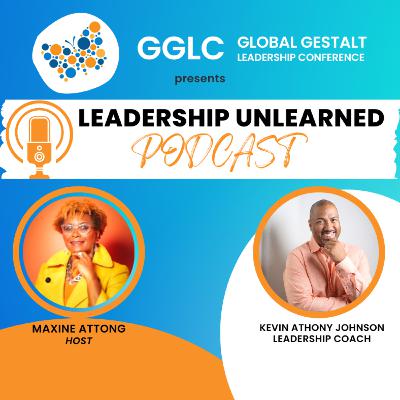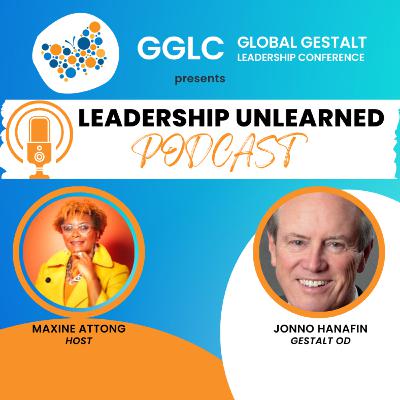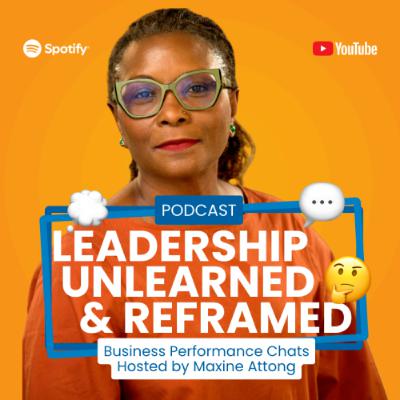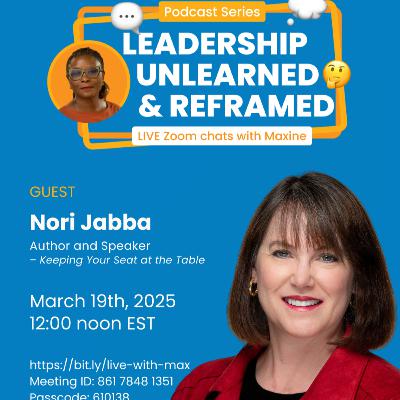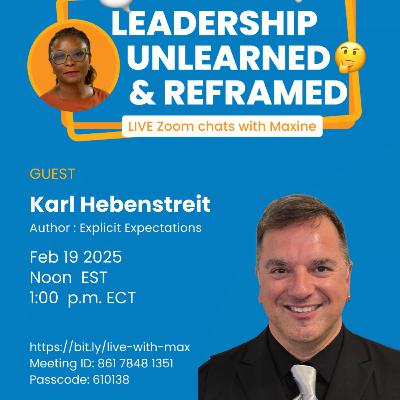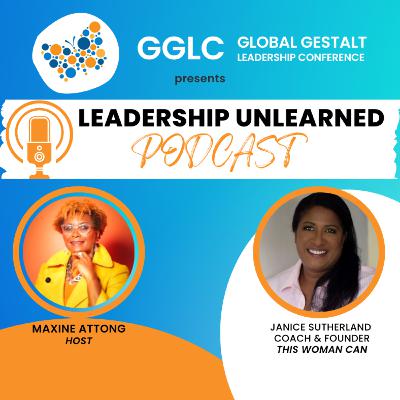Discover LEADERSHIP UNLEARNED ( and Reframed)
LEADERSHIP UNLEARNED ( and Reframed)

LEADERSHIP UNLEARNED ( and Reframed)
Author: Maxine Attong
Subscribed: 11Played: 37Subscribe
Share
© Maxine Attong
Description
When we speak about leadership, we are not only speaking about a role in an organization. We invite you to take up your leadership mantle wherever you are - your places of worship, your community, your households, your sports team. Wherever you are, you can display your leadership.
If you think that someone like you cannot be a leader, we invite you to unlearn that. Since we are taking away, we're going to give you something in exchange. We are offering a reframe of leadership so that you can walk away from this program with one new thought or willingness to do something differently.
If you think that someone like you cannot be a leader, we invite you to unlearn that. Since we are taking away, we're going to give you something in exchange. We are offering a reframe of leadership so that you can walk away from this program with one new thought or willingness to do something differently.
98 Episodes
Reverse
Eric Gerber is the #Founder of Podcast Connection.
What did this #musician do during the #pandemic?
He goes into #survivalmode and takes his #contentcreation and #marketing skills to create a new business.
In this episode he shares how he answered the questions
1. How can we create a company that does not rely on being face to face all the time?
2. How to encourage teams to be present on Zoom meetings?
3. How to make it work as an online company?
These are the tips that he shared
1. In a world full of #chaos people need structure and direction. Leaders need to create an organised and predictable environment.
2. Cloud based technology, effective and regular meetings are critical for remote teams to be effective
3. Zoom lunches may not always work for team building (especially if the boss is present), try online games instead
4. Remote team members need a sense of belonging since they may feel #isolated
5. Use smaller teams in which each team member has specific roles. Team members provide support to each other.
6. Have regular meetings, have one-on-one meetings and meet with functional team members from different teams and meet with the whole organisation as well.
7. Gives tips on how to improve productivity and how to stay motivated to team members to create constant learning.
8. Promote accountability by ensuring that one person is responsible for each action. Track accountability with online tools that all can access
9. Celebrate small victories and recognise people
10. To work in a remote space you need administration skills, self discipline and to take responsibility
Download this free gift from Eric https://podcastconnection.org/leadershipunlearned/
We are pleased to welcome Karl Hebestreit, Executive Coach and Enneagram Specialist.
Karl Shares
1. The difference between the golden rule and the platinum rule
2. The paradox of our strengths - they may put and keep us in a box
3. The role of forgiveness, empathy and love in leadership
4. The power of the Enneagram
5. Enneagram can be a guide to personal development
6. Enneagram helps us to step our of our protective boxes and see each other's motivations
He leaves us with 3 provocative questions
1. What box are you in?
2. Is your box still serving you?
3. How do you leverage your box for the situation you are in?
Shahad Ali is the PRO for the Unicomer brand in Trinidad and Tobago.
In this episode he shares about the Unicomer brand's with special attention to eyeware. He also shares about surviving the pandemic, time management and what he learned about leadership.
:
Kevin Anthony Johnson is a leadership Coach. IN this episode he shares how he has observed uncertainty affecting leaders.
He also speaks about inclusivity magic and power
IF you ahve any questions or comments please share with us at info@maxineattong.com
The night before our 5th Global Gestalt Leadership Conference our keynote speaker - Jonno Hanafin - popped into studio to discuss this idea.
He shares that
1/ After the pandemic, workers are choosing themselves
2 It's not a problem to show up being different
3. Love exists in organisations, we don't call it that
and much more
Liz Kislik explains the difference between management consulting and leadership coaching.
She explains the similarity and the differences between the two disciplines .
And then, things take a turn...
Four steps for leaders who want to lead from their intention. Learn how to set your leadership intention and to lead with this intention.
One of the biggest enemies of our intentions is our ego. Learn how to minimise the impacts of the ego to ensure that we continue leading from our intentions
#leadership #leadingwithintention #leadershipjourney #caribbeanleadership #leadershipconsulting #leadershipcoach
It is a mathematical way to look at our life. There are two constants Life and Death. =In between that time there is a variable that you get to make a lot of choices about.
What is your x? What does it stand for and what are you going to do with it? We are examining the x in each of our life’s and it specifically relates to our leadership and our leadership journey.
#leadership #leadershipjourney #Caribbeanleaders #leadershipconsulting #leadershipdevelopment #leaderhsipcoach
This is the Leadership Unlearned Radio Program. We invite our listeners to suspend all that they believe and know about leadership.
Every Wednesday on I95.5FM at approximately 6.35 p.m you can tune in to the program. Three Wednesdays of 10 - 15 minute talks and the last Wednesday of each month is a call in program with a live studio guest for 30 minutes,
Four tips to be impactful with your leadership.
Awareness
Being in the here and now
Hold the space
#leadership #leadershipconsulting #leadershipawareness #caribbeanleadership #leadershipcoach #leadershipawareness
Author Nori Jabba joins us to share her journey from rejection to reinvention. In this candid conversation, she opens up about writing "Keeping Your Seat at the Table", navigating ageism and sexism in the workplace, and the powerful leadership lesson she learned from an unexpected HR comment: the importance of truly listening.Whether you're a mid-career professional, a leader navigating your voice, or someone redefining your place in the workplace, this episode offers wisdom, encouragement, and some serious truth bombs.🔊 Topics we cover:– Reinventing yourself in midlife– Why women over 40 are often misunderstood in the workplace– How listening can be your strongest leadership asset– Owning your voice and redefining success📚 Learn more about Nori's book: Keeping Your Seat at the Table🎧 And her audiobook journey—yes, she narrates it herself!✨ Don’t forget to like, comment, and subscribe for more real conversations about leadership, resilience, and growth.
Karl Hebenstreit shares his new book, Explicit Expectation with Maxine Attong. He focuses on the importance of explicit expectations in leadership and the transition from the traditional “Golden Rule” of leadership to a more nuanced “Platinum Rule.” Karl explains how individual perceptions of expectations can lead to miscommunication and disengagement within teams. He advocates for a shift from rigid performance management systems, which fail to adapt to changing conditions, to a more fluid, inclusive approach to leadership that fosters open communication and mutual understanding. By promoting clarity in collective goals, values, and individual motivations, leaders can create a more supportive environment that enables teams to thrive amid constant change.Highlights• 🌍 Inclusive Leadership: Leadership should be embraced by everyone, in all contexts, not limited to organizational roles.• 🏅 Platinum Rule: Moving from the “Golden Rule,” which assumes everyone thinks alike, to the more inclusive “Platinum Rule” is essential for effective leadership.• 🔄 Adaptation to Change: Change is constant, and expectations should be made explicit and adaptive to new circumstances rather than static.• ✉️ Open Communication: Leaders must create environments where explicit expectations can be discussed freely, eliminating mind-reading assumptions.• 📈 Performance Management Evolution: Traditional performance management systems are being replaced with more flexible, continuous feedback processes.• 👫 Uniting Values and Motivation: Understanding diverse motivations within teams encourages stronger connections and improved productivity.• 🌊 Embrace the Slush State: Organizations need to acknowledge that they cannot “refreeze” after change; instead, they should navigate through a fluid, evolving landscape.Key Insights• 🤝 Transformative Leadership: Leadership is a collective, participatory journey rather than a top-down approach. When every individual takes ownership of their leadership potential, they create a more cohesive and empowered community.• 💬 Communication is Crucial: The explicit communication of expectations between leaders and team members fosters trust and engagement. It’s essential to have honest dialogues about needs and perceptions, ensuring everyone is heard and understood.• 🌟 Value the ‘How’ Over the ‘What’: Organizations often emphasize outcomes (the ‘what’) but neglect the process (the ‘how’), which is where core values are expressed. Emphasizing the ‘how’ leads to healthier workplace cultures that prioritize integrity and social responsibility.• 🔄 Agility in Leadership: Adapting leadership styles to the fluid nature of modern work environments is key. This demands an ongoing evaluation of performance objectives and team dynamics to remain relevant and responsive.• 🏆 Diversity of Thought: Leaders who understand varied motivation types not only reduce attrition rates but also enhance team performance by aligning individual strengths and passions with organizational goals.• 🌐 The Role of Community: In a competitive corporate landscape, fostering a community-oriented work culture enables organizations to thrive. This transforms competition into collaboration, enhancing overall satisfaction and performance.• ⏳ Revisiting Organizational Values: Corporate values often become outdated; therefore, regularly evaluating mission and vision statements is critical. This ensures that they resonate deeply with both employees and the market, leading to genuine alignment and engagement.In this engaging dialogue, the emphasis lies on redefining leadership in a manner that focuses on inclusivity, clarity, and continuous adaptation to achieve excellence in a world characterized by rapid change. The leaders of tomorrow will thrive by applying innovative frameworks that integrate expectations, ethics, and emotional intelligence into the heart of their organizational practices.
.Clare Stafford Taylaur, CEO and co-founder of Conscious Consulting, and Maxine Attong delve into the importance of fostering conscious leadership, emphasizing the spiritual aspect of leadership, which integrates intellect, intuition, emotions, and experiences. Clare explains the relevance of spirituality in leadership, advocating for conscious leadership that focuses on self-awareness and understanding the connection between personal and organizational values. Highlights🌍 Leadership as Universal: Leadership is a quality inherent in everyone, extending beyond formal roles in organizations.🙏 Spirituality in Leadership: Emphasizing the integration of spirituality, emotions, and intuition into leadership practices for holistic growth.📈 Value Creation: Organizations need to create financial, social, and environmental value rather than solely focusing on profit.🔗 Conscious Culture: Building a conscious organizational culture requires aligning expressed values with actual cultural practices through methods like Barrett Values Assessment.💡 The Role of Intuition: Professionals must learn to appreciate intuition alongside rational thought in decision-making processes.💔 Accepting Dysfunction: Many organizations resist change, preferring familiar dysfunction because it serves an unacknowledged purpose.🤝 People-Centered Organizations: The future of organizations lies in prioritizing employee well-being and fostering collaboration over rigid structures.Key Insights💬 Leadership as a Soft Skill: The recognition that emotional intelligence and intuition are not just complementary to but essential in leadership roles is critical, especially for technically oriented professionals. This insight advocates for a softening of the boundaries that typically separate empirical decision-making from more intuitive practices, arguing that decision-making should engage all facets of human experience.💖 Navigating Organizational Culture: Clare's approach highlights the need for deliberately cultivating organizational culture. By using tools like Barrett Values Assessment, organizations can assess their current culture, identify gaps between espoused and actual values, and take steps toward aligning them, thereby fostering a meaningful workplace.🌱 Resistance to Change: Recognizing the comfort embedded in dysfunction sheds light on the challenges many organizations face when trying to implement change. The awareness that some entities may prefer familiar discomfort rather than embracing a new, healthy culture provides a realistic backdrop against which consultants can work, signaling the significance of patient, guiding transformation.📊 Measuring Success Beyond Metrics: traditional measures of success often overshadow the intangible benefits of a strong organizational culture. Expanding the definition of value to include well-being as a metric for organizational success can result in a more sustained, positive impact on productivity.⏳ The Evolution of Leadership: The growing emphasis on conscious leadership reflects an evolution in how leadership is perceived and practiced. In the context of shifting generational values, this evolution represents a potential turning point where companies embrace a more humane approach to business.🌈 Synergy Between Work and Family: Clare's alignment of personal and professional life highlights the benefits of an organizational culture that respects family needs. By designing flexible systems that allow for both personal and work priorities to coexist, organizations can foster engagement and retention among their employees.📅 Future of Work: The conversation indicates a burgeoning trend toward organizations that value human impacts as much as financial ones. As the landscape of work continues to evolve, organizations are increasingly recognizing that employee satisfaction and engagement drive long-term success and innovation.
We are intelligent, we have read books, and we have the relevant experience.
Yet the best way that we can lead is with the use of ourself, once we get over ourselves.
in this episode I share how self belief can help or limit the leaders ability to lead effectively.
Rama Naidu, Founder of 6 Degree Shift, joins Maxine Attong in a thought-provoking dialogue exploring the evolving expectations and roles associated with leadership. They emphasize the shift from a top-down leadership paradigm, where leaders are seen as all-knowing figures, to one that champions collaboration, empowerment, and humility. This modern view of leadership encourages leaders to become conveners, facilitating dialogues among diverse voices rather than asserting their control.The conversation reflects on the changing landscape of leadership expectations influenced by social media and increasing public consciousness. Leaders today face the challenge of meeting higher expectations while lacking the certainty and control that characterized previous leadership models. The dialogue also highlights the importance of emotional intelligence in fostering genuine connections and nurturing trust within teams.The discussion extends to the role of younger generations in leadership and their capacity to influence and reshape these dynamics. It advocates for intergenerational dialogue, suggesting that collective wisdom can emerge when leaders step back from their traditional roles.• Role of the Leader: Modern leaders are encouraged to be conveners, facilitating discussions and empowering others rather than exerting control.• Impact of Social Media: The discourse acknowledges how social media and heightened awareness have reshaped leadership expectations.• Emotional Intelligence: Emotional intelligence emerges as vital for leaders to connect authentically and foster trust.• Younger Generations: The conversation emphasizes the need to involve younger generations in dialogue about leadership as they bring fresh perspectives.• Collective Wisdom: Intergenerational dialogues enrich understanding by combining traditional knowledge with modern insights.• Agency and Rebellion: Reconceptualizing youthful rebellion as agency allows leaders to constructively channel the energy and ideas of younger demographics.Key Insights• Reframing Leadership: Leaders must redefine their roles away from being the “smartest” individuals in the room to recognizing and harnessing the collective wisdom of their teams. This reframing acknowledges the limitations of traditional expertise-driven leadership, advocating for a collective approach to problem-solving and innovation.•The Role of a Convenor: The transition to a convenor role requires emotional intelligence and vulnerability, as leaders must be willing to admit they don’t have all the answers and instead facilitate discussions that empower others to share their insights and solutions.• Resistance to Adaptation: Cultural norms can deter individuals from stepping into active leadership roles. Building trust within teams is essential, as followers may initially resist engaging fully in collaborative processes due to established hierarchies and traditional perceptions of leadership.• Cultural Context of Leadership: Attention to the wisdom embedded in non-Western leadership philosophies, such as Ubuntu, which emphasize collective well-being and community involvement against the individualistic tendencies dominant in Western models.• 🕊️ Future Implications: If leaders embrace their role as convenors, they may mitigate feelings of loneliness and anxiety often associated with leadership by creating a supportive, collaborative environment that alleviates the burdens of decision-making.• Youth as Change Agents: Younger generations demonstrate a natural inclination toward collaboration and agility that contrasts with older paradigms of leadership. Their fresh perspective challenges structures of authority and can drive significant change if adequately harnessed.• Impact of Emotional Intelligence: Emotional intelligence, , emerges as a cornerstone of effective leadership. Leaders can leverage it to foster inclusive conversations that encourage collective solutions and creativity.
Alana Josell is a team coach who lives and works in South Africa. She shares her experiences and observation with us.
Awareness - 4.35
7.18 Bravery
9.42 - Trust
15.38 -Questions from the audience
21.30 - Change and Anxiety
22.47 - paradox of Leadership
25.24 - Multiple Realities
26.38 - Centering Self
34.00 Difference between team coaching and facilitation
42.01 - Questions from audience
48.36 - Audience joins in
49.47 - Awareness
51.- Wrap Up
Team Coachr Ai is a tool that helps teams and team members to be more effective. This tool learns and provides a road map fro the team and each individual team member.
the AI model was developed based on the work of Leoncini and other theories of team development.
Julie Hansen is an actor who has leveraged her actings skills and time on camera to create a whole new career.
Her niche is helping leaders get comfortable in the virtual world without losing their influence.
In this podcast episode Julies shares tips on carer change, influence and so much more
Janice Sutherland share ow she n=moved from being a CEO to being the "woman whisperer"
She works with women over 40 who are asking What's next?" Janice shares her four step formula and some tips to get you through it.
Mary Patry was the little woman in IT, who now helps women leaders in IT. She shares her story of being the only one to supporting others.
She shares about the power of community, understanding her white privilege and the whole lot of courage it took for her to succeed.





